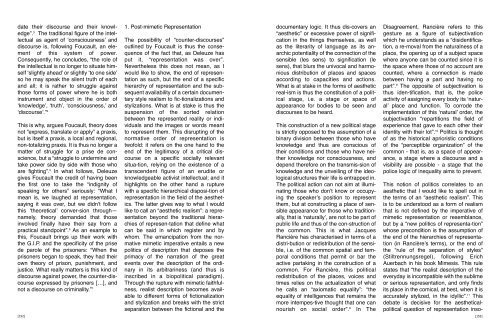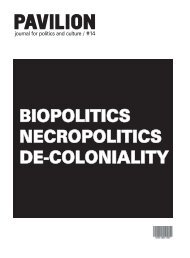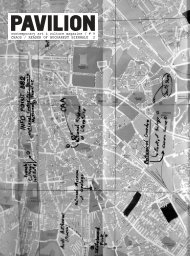PAVILION
PAVILION
PAVILION
- No tags were found...
Create successful ePaper yourself
Turn your PDF publications into a flip-book with our unique Google optimized e-Paper software.
date their discourse and their knowledge”.<br />
3 The traditional figure of the intellectual<br />
as agent of ‘consciousness’ and<br />
discourse is, following Foucault, an element<br />
of this system of power.<br />
Consequently, he concludes, “the role of<br />
the intellectual is no longer to situate himself<br />
‘slightly ahead’ or slightly ‘to one side’<br />
so he may speak the silent truth of each<br />
and all; it is rather to struggle against<br />
those forms of power where he is both<br />
instrument and object in the order of<br />
‘knowledge’, ‘truth’, ‘consciousness,’ and<br />
‘discourse’.” 4<br />
This is why, argues Foucault, theory does<br />
not “express, translate or apply” a praxis,<br />
but is itself a praxis, a local and regional,<br />
non-totalizing praxis. It is thus no longer a<br />
matter of struggle for a prise de conscience,<br />
but a “struggle to undermine and<br />
take power side by side with those who<br />
are fighting”. 5 In what follows, Deleuze<br />
gives Foucault the credit of having been<br />
the first one to take the “indignity of<br />
speaking for others” seriously: “What I<br />
mean is, we laughed at representation,<br />
saying it was over, but we didn’t follow<br />
this ‘theoretical’ conver-sion through—<br />
namely, theory demanded that those<br />
involved finally have their say from a<br />
practical standpoint”. 6 As an example to<br />
this, Foucault brings up their work with<br />
the G.I.P. and the specificity of the prise<br />
de parole of the prisoners: “When the<br />
prisoners began to speak, they had their<br />
own theory of prison, punishment, and<br />
justice. What really matters is this kind of<br />
discourse against power, the counter-discourse<br />
expressed by prisoners […], and<br />
not a discourse on criminality.” 7<br />
1. Post-mimetic Representation<br />
The possibility of “counter-discourses”<br />
outlined by Foucault is thus the consequence<br />
of the fact that, as Deleuze has<br />
put it, “representation was over”.<br />
Nevertheless this does not mean, as I<br />
would like to show, the end of representation<br />
as such, but the end of a specific<br />
hierarchy of representation and the subsequent<br />
availability of a certain documentary<br />
style realism to fic-tionalizations and<br />
stylizations. What is at stake is thus the<br />
suspension of the sorted relation<br />
between the represented reality or individuals<br />
and the images or words meant<br />
to represent them. This disrupting of the<br />
normative order of representation is<br />
twofold: it refers on the one hand to the<br />
end of the legitimacy of a critical discourse<br />
on a specific socially relevant<br />
situa-tion, relying on the existence of a<br />
transcendent figure of an erudite or<br />
knowledgeable activist intellectual; and it<br />
highlights on the other hand a rupture<br />
with a specific hierarchical disposi-tion of<br />
representation in the field of the aesthetics.<br />
The latter gives way to what I would<br />
like to call an “aesthetic realism”: a representation<br />
beyond the traditional hierarchies<br />
of represen-tation that define what<br />
can be said in which register and by<br />
whom. The emancipation from the normative<br />
mimetic imperative entails a new<br />
politics of description that deposes the<br />
primacy of the narration of the great<br />
events over the description of the ordinary<br />
in its arbitrariness (and thus is<br />
inscribed in a biopolitical paradigm).<br />
Through the rupture with mimetic faithfulness,<br />
realist description becomes available<br />
to different forms of fictionalization<br />
and stylization and breaks with the strict<br />
separation between the fictional and the<br />
documentary logic. It thus dis-covers an<br />
“aesthetic” or excessive power of signification<br />
in the things themselves, as well<br />
as the literarity of language as its anarchic<br />
potentiality of the connection of the<br />
sensible (les sens) to signification (le<br />
sens), that blurs the univocal and harmonious<br />
distribution of places and spaces<br />
according to capacities and actions.<br />
What is at stake in the forms of aesthetic<br />
real-ism is thus the constitution of a political<br />
stage, i.e. a stage or space of<br />
appearance for bodies to be seen and<br />
discourses to be heard.<br />
This construction of a new political stage<br />
is strictly opposed to the assumption of a<br />
binary division between those who have<br />
knowledge and thus are conscious of<br />
their conditions and those who have neither<br />
knowledge nor consciousness, and<br />
depend therefore on the transmis-sion of<br />
knowledge and the unveiling of the ideological<br />
structures their life is entrapped in.<br />
The political action can not aim at illuminating<br />
those who don’t know or occupying<br />
the speaker’s position to represent<br />
them, but at constructing a place of sensible<br />
appearance for those who traditionally,<br />
that is ‘naturally’, are not to be part of<br />
public life and thus of the con-struction of<br />
the common. This is what Jacques<br />
Rancière has characterised in terms of a<br />
distri-bution or redistribution of the sensible,<br />
i.e. of the common spatial and temporal<br />
conditions that permit or bar the<br />
active partaking in the construction of a<br />
common. For Rancière, this political<br />
redistribution of the places, voices and<br />
times relies on the actualization of what<br />
he calls an “axiomatic equality”: “the<br />
equality of intelligences that remains the<br />
more intempes-tive thought that one can<br />
nourish on social order”. 8 In The<br />
Disagreement, Rancière refers to this<br />
gesture as a figure of subjectivation<br />
which he understands as a “disidentification,<br />
a re-moval from the naturalness of a<br />
place, the opening up of a subject space<br />
where anyone can be counted since it is<br />
the space where those of no account are<br />
counted, where a connection is made<br />
between having a part and having no<br />
part”. 9 The opposite of subjectivation is<br />
thus iden-tification, that is, the police<br />
activity of assigning every body its ‘natural’<br />
place and function. To corrode the<br />
implementation of this ‘natural’ order, the<br />
subjectivation “repartitions the field of<br />
experience that gave to each other their<br />
identity with their lot”. 10 Politics is thought<br />
of as the historical aprioristic conditions<br />
of the “perceptible organization” of the<br />
common - that is, as a space of appearance,<br />
a stage where a discourse and a<br />
visibility are possible - a stage that the<br />
police logic of inequality aims to prevent.<br />
This notion of politics correlates to an<br />
aesthetic that I would like to spell out in<br />
the terms of an “aesthetic realism”. This<br />
is to be understood as a form of realism<br />
that is not defined by the imperative of<br />
mimetic representation or resemblance,<br />
but by a “new politics of representa-tion”<br />
whose precondition is the assumption of<br />
the end of the hierarchies of representation<br />
(in Rancière’s terms), or the end of<br />
the “rule of the separation of styles”<br />
(Stiltrennungsregel), following Erich<br />
Auerbach in his book Mimesis. This rule<br />
states that “the realist description of the<br />
everyday is incompatible with the sublime<br />
or serious representation, and only finds<br />
its place in the comical, at best, when it is<br />
accurately stylized, in the idyllic”. 11 This<br />
debate is decisive for the aestheticalpolitical<br />
question of representation inso-<br />
[152]<br />
[153]








